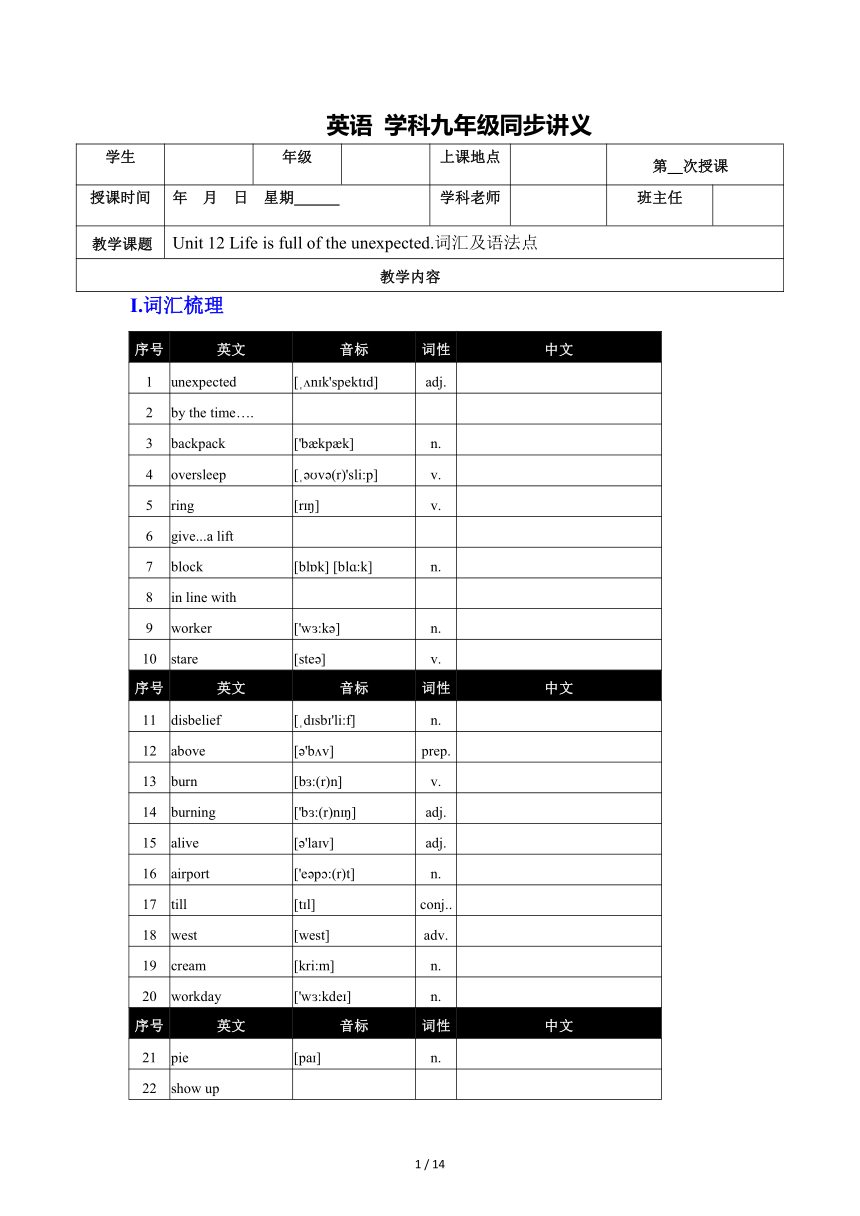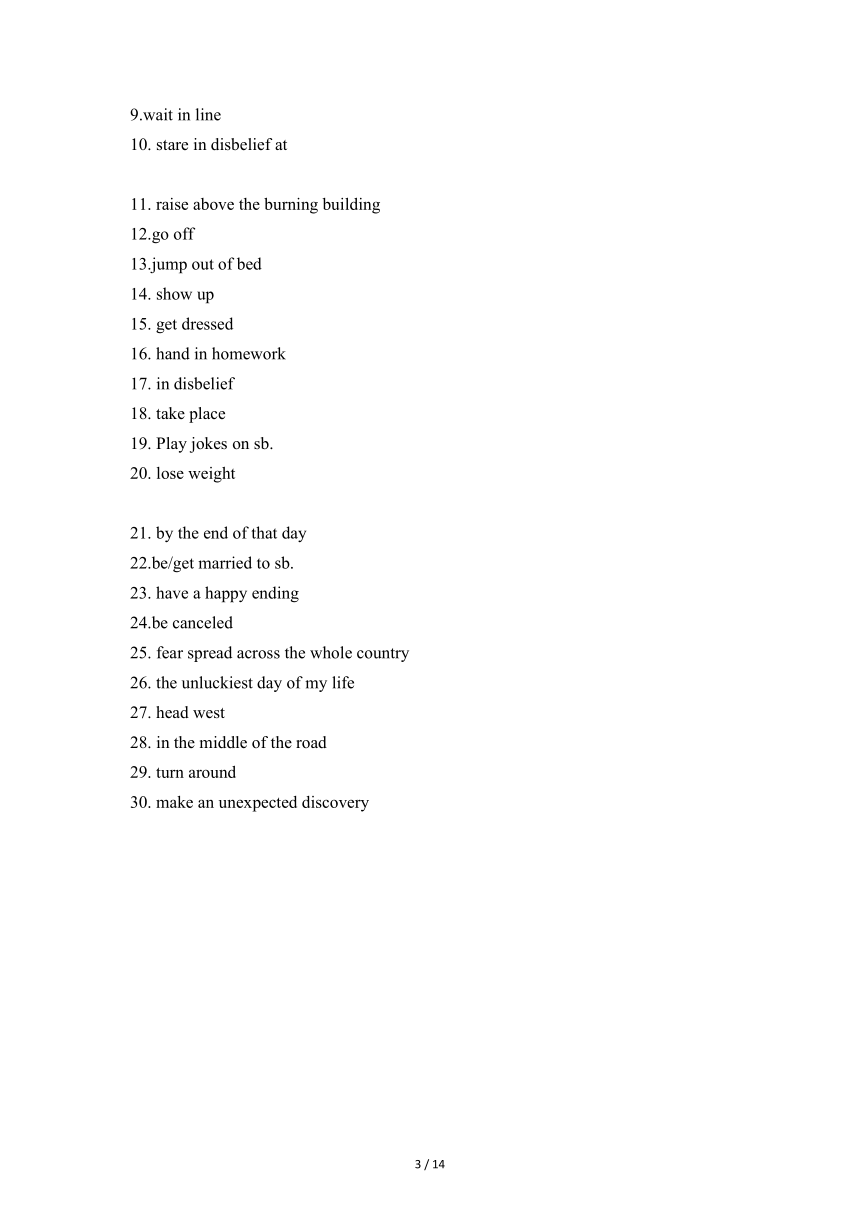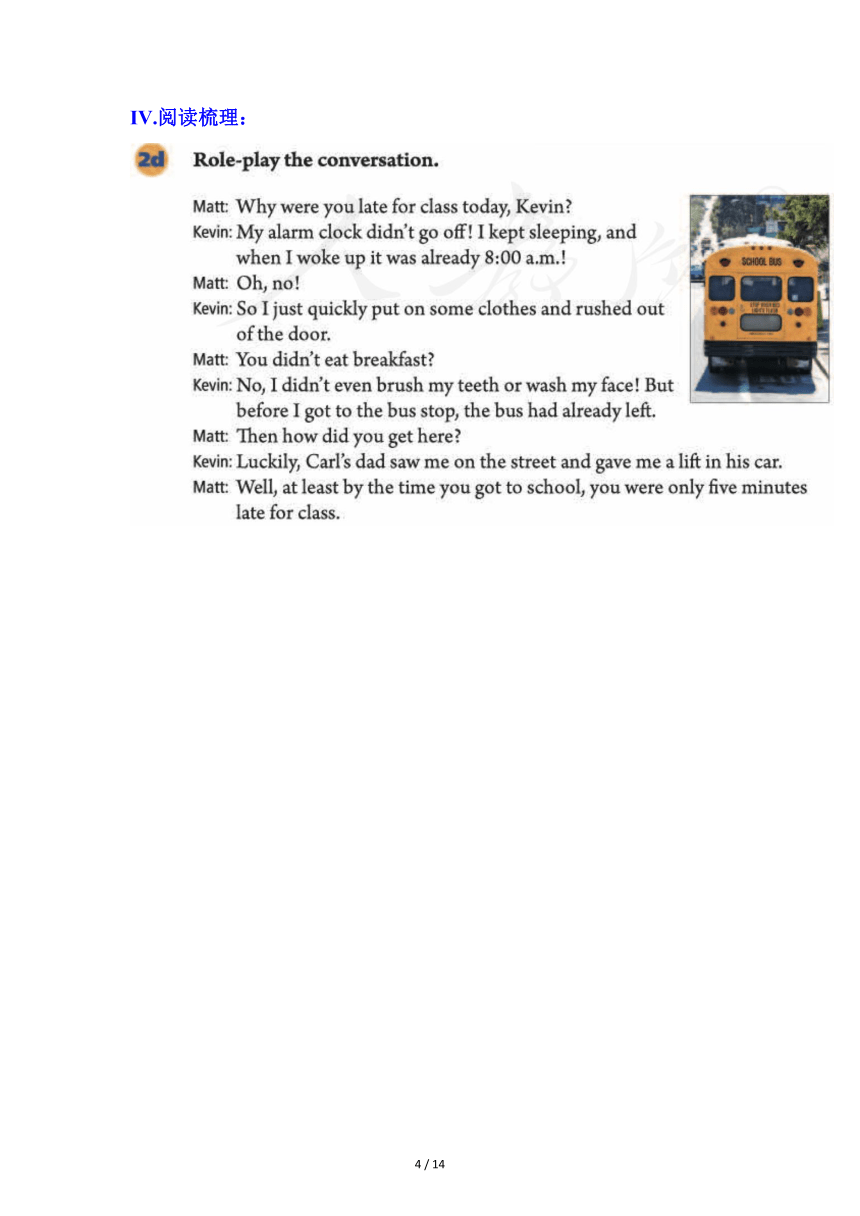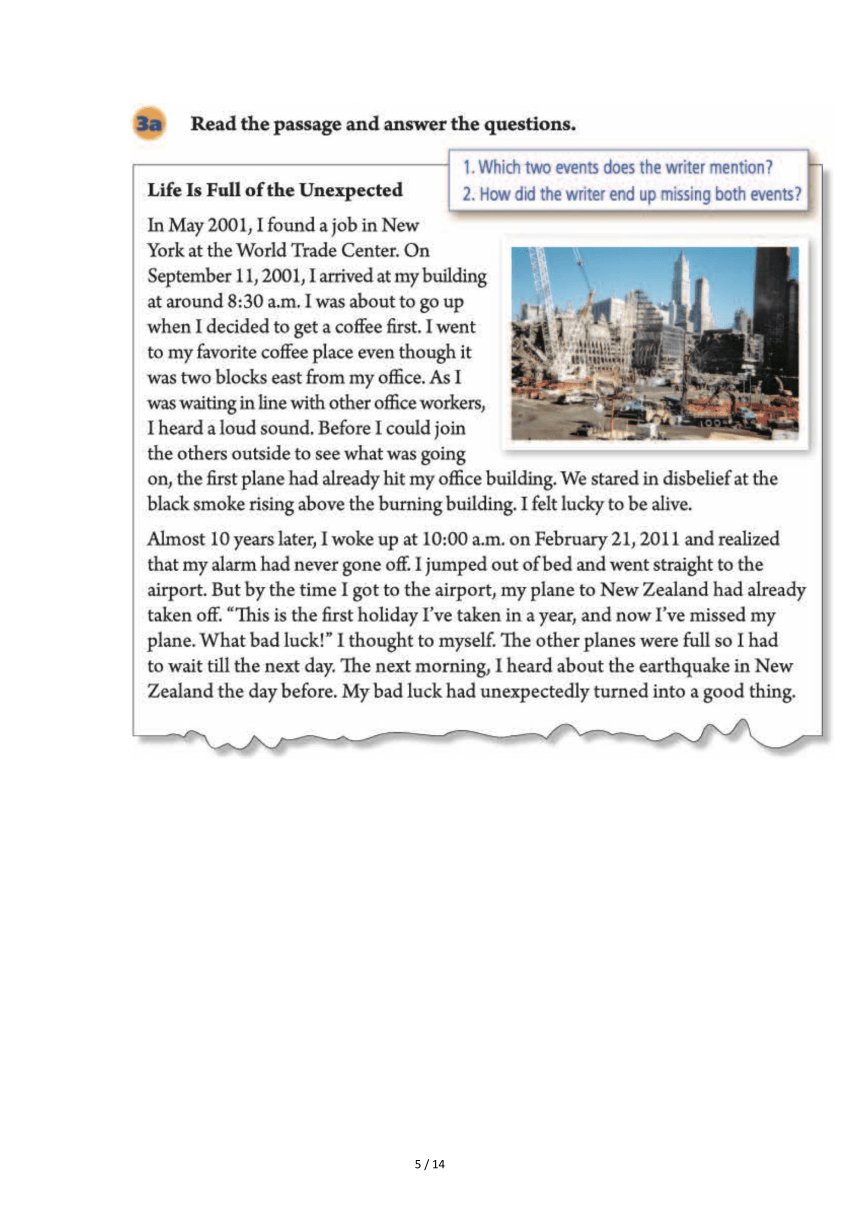Unit12 Life is full of the unexpected.同步讲义及练习2021-2022学年人教新目标九年级英语全一册
文档属性
| 名称 | Unit12 Life is full of the unexpected.同步讲义及练习2021-2022学年人教新目标九年级英语全一册 |  | |
| 格式 | docx | ||
| 文件大小 | 2.5MB | ||
| 资源类型 | 教案 | ||
| 版本资源 | 人教新目标(Go for it)版 | ||
| 科目 | 英语 | ||
| 更新时间 | 2022-01-02 19:12:45 | ||
图片预览





文档简介
英语 学科九年级同步讲义
学生 年级 上课地点 第 次授课
授课时间 年 月 日 星期 学科老师 班主任
教学课题 Unit 12 Life is full of the unexpected.词汇及语法点
教学内容
I.词汇梳理
序号 英文 音标 词性 中文
1 unexpected [ n k'spekt d] adj.
2 by the time….
3 backpack ['b kp k] n.
4 oversleep [ v (r)'sli:p] v.
5 ring [r ] v.
6 give...a lift
7 block [bl k] [blɑ:k] n.
8 in line with
9 worker ['w :k ] n.
10 stare [ste ] v.
序号 英文 音标 词性 中文
11 disbelief [ d sb 'li:f] n.
12 above [ 'b v] prep.
13 burn [b :(r)n] v.
14 burning ['b :(r)n ] adj.
15 alive [ 'la v] adj.
16 airport ['e p :(r)t] n.
17 till [t l] conj..
18 west [west] adv.
19 cream [kri:m] n.
20 workday ['w :kde ] n.
序号 英文 音标 词性 中文
21 pie [pa ] n.
22 show up
23 bean [bi:n] n.
24 market ['ma:(r)k t] n.
25 by the end of
26 fool [fu:l] n.
27 costume ['k stju:m] n.
28 embarrassed [ m'b r st] adj.
29 costume party
30 announce [ 'na ns] v.
序号 英文 音标 词性 中文
31 spaghetti [sp 'ɡet ]] n.
32 hoax [h ks] n.
33 sell out
34 discovery [d 'sk v ri] n.
35 lady ['le di] n.
36 cancel ['k nsl] v.
37 officer [' f s ] n.
38 believable [b 'li:v bl] adj.
39 disappear [ d s 'p ] v.
40 embarrassing [ m'b r s ] adj.
序号 英文 音标 词性 中文
41 miss [m s] v.
42 NewZealand [ nju:'zi:l nd]
II.重点短语
1.by the time
2.take a shower
3.leave my backpack at home
4.get back to school
5. rush out the door
6.give sb. a lift
7.be full of unexpected
8. be about to do sth.
9.wait in line
10. stare in disbelief at
11. raise above the burning building
12.go off
13.jump out of bed
14. show up
15. get dressed
16. hand in homework
17. in disbelief
18. take place
19. Play jokes on sb.
20. lose weight
21. by the end of that day
22.be/get married to sb.
23. have a happy ending
24.be canceled
25. fear spread across the whole country
26. the unluckiest day of my life
27. head west
28. in the middle of the road
29. turn around
30. make an unexpected discovery
IV.阅读梳理:
V.单元语法点
过去完成时
1.过去完成时的概念
过去完成时表示在过去的某一时间或动作之前已经完成的动作,即表示“过去的过去”。
2. 过去完成时的各种句式结构
过去完成时是由“助动词had+动词的过去分词”构成的,had用于各种人称和数。
(1)肯定句:主语+had+动词的过去分词+其他.
(2)否定句:主语+had+not+动词的过去分词+其他.
(3)一般疑问句:Had+主语+动词的过去分词+其他?
肯定回答: Yes,主语+had.否定回答:No,主语+hadn't.
(4)特殊疑问句:特殊疑问词或词组+一般疑问句(即:had+主语+动词的过去分词+其他)
(5)被动语态:主语+had(not)+been+动词的过去分词+其他.
3.过去完成时的判断依据
(1) 由时间状语来判定
一般说来,各种时态都有特定的时间状语。与过去完成时连用的时间状语有by/by the end of/before+过去的时间点,by the time+一般过去时从句等。如:
I had finished reading the novel by nine o'clock last night.到昨天晚上九点钟,我已经读完这部小说。
We had learned over two thousand English words by the end of last term.到上学期末,我们已经学完了超过两千个英语单词了.
The bus had already left by the time/when I got there.我到达那里时,公共汽车已经离开了。
(2)由“过去的过去”来判定
过去完成时表示“过去的过去”,是指过去某一动作之前已经发生或完成的动作,即动作有先后关系,动作在前的用过去完成时,在后的用一般过去时。这种用法常出现在:
①宾语从句中
当宾语从句的主句为一般过去时,且从句的动作先于主句的动作时,从句要用过去完成时。在told,said,knew,heard,thought等动词后的宾语从句要用过去完成时。如:
She said that she had seen the film before.她说她以前看过这部电影。
②状语从句中
在时间、条件、原因、方式等状语从句中,主、从句的动作发生有先后关系,动作在前的,要用过去完成时,动作在后的要用一般过去时。
After he had finished his homework,he went to bed.他完成作业后就上床睡觉了。
注意: before,after 引导的时间状语从句中,由于 before 和 after 本身已表达了动作的先后关系,若主句、从句表示的动作紧密相连,则主句、从句都用一般过去时。
Where did you study before you came here?你来到这儿前在哪儿学习?
After he closed the door,he left the classroom.他关上门后就离开了教室。
(3)根据上、下文来判定。
I met Wang Tao in the street yesterday. We hadn't seen each other since he went to Beijing.我昨天在街上碰见王涛了。自从他去了北京,我们就没见过面了。
4.过去完成时的主要用法
(1)过去完成时表示一个动作或状态在过去某一时间或动作之前已经完成或结束,即发生在“过去的过去”。
When I woke up,it had stopped raining.我醒来时,雨已经停了。(“雨停”发生在“我醒来”之前)
(2)过去完成时是一个相对的时态,表示的是“过去的过去”,只有和过去某一时间或某一动作相比较时才使用它。
He told me that he had written a new book.他告诉我他写了一本新书。(had written 发生在 told 之前)
(3)过去完成时需要与一个表示过去的时间状语连用,它不能离开过去时间而独立存在。此时多与 already,yet,still,just,before,never 等时间副词及 by,before,until 等引导的短语或从句连用。
Peter had collected more than 300 Chinese stamps by the time he was ten.彼得到10岁的时候已经收集了300多张中国邮票。
(4)过去完成时表示某一动作或状态在过去某时之前已经开始,一直延续到这一过去时间,而且动作尚未结束,仍然有继续下去的可能。
By the end of last year,he had worked in the factory for twenty years.到去年年底为止,他已经在这个工厂工作了20年了。(已经工作了 20 年,还有继续进行下去的可能)
5.过去完成时与一般过去时的区别
(1)时间状语不同:过去完成时在时间上强调“过去的过去”;而一般过去时只强调过去某一特定的时间。
They had already left when I arrived.我到达时他们已经走了。(在我“到达”这一过去动作之前,他们就已经“离开”了,因此用had left表示)
I saw him in the street yesterday.昨天我在街上看见他了。(“看见他”这一动作是在“昨天”这一过去的时间发生的)
(2)在没有明确的过去时间状语作标志时,谓语动词动作发生的时间先后须依据上下文来判断:先发生的用过去完成时,后发生的则用一般过去时。
When I woke up,it had already stopped snowing.我醒来时雪已经停了。
(3)当两个或两个以上接连发生的动作用 and 或 but 连接时,按时间顺序,只需用一般过去时来代替过去完成时;另外,在 before,after,as soon as 引导的从句中,由于这些连词本身已经表示出时间的先后,因此也可以用过去时来代替过去完成时。
I (had) heard the news before she told me.她告诉我那个消息之前我已经听说了。
6.过去完成时与现在完成时的区别
过去完成时与already,ever,just,never,since+时间点,for+时间段等连用时,强调事件发生的先后顺序,不涉及现在的情况。而现在完成时强调的是“过去的动作或状态对现在造成的影响”。
She has worked in Chongqing for over two years.她已经在重庆工作两年多了。(现在仍在那儿工作)
She had worked in Chongqing for over two years before she moved to Shanghai.她在搬到上海之前已经在重庆工作两年多了。(“搬到上海”是过去,“在重庆工作”是发生在过去的过去)
He has never seen such an interesting film before.他以前从未看过这么有趣的电影。(“看”尽管发生在过去,但涉及现在,即现在已经知道或了解了这部电影)
He said he had never seen such an interesting film before.他说他以前从没看过这么有趣的电影。(“他说”发生在过去,“看过”是在“说”之前,是过去的过去)
【课堂测评】
一.重点短语:
1.到……时候 2.洗浴
3.把背包忘在家里 4.返回学校
5.冲出房门 6.捎某人一程
7.充满着不可预知性 8. 正要做某事
9.排队等候 10. 难以置信地盯着
11.从正在燃烧的楼上升起 12.发出响声
13.跳下床 14. 赶到,出现
15. 紧张 16. 上交作业
17. 怀疑地 18. 发生
19. 和某人开玩笑 20. 减肥
21. 到那天结束时 22.与某人结婚
23. 有一个幸福的结局 24.被取消
25. 恐惧席卷整个国家 26. 一生中最不幸的一天
27. 向西行驶 28.在路中间
29. 调头 30.作一个出乎意料的发现
二.单选练习:
( )1.France is ______ European country and Japan is ______ Asian country.
A.an;the B.a;a C.a;an
( )2.The new suspension(悬浮的) bridge ______ by the end of last month.
A.has been designed B.had been designed C.was designed
( )3.—Is the airport closed because of the bad weather
—No.But my flight to Beijing was ______ because of it.
A.canceled B.locked C.lost
( )4.—Was it your first visit to the museum
—No.I had visited it ______.But I thought it worth a second visit.
A.a day ago B.next week C.the day before
( )5.The little boy ______ me for a few minutes before his mother showed up.
A.stares at B.has stared at C.had stared at
( )6.Before the school bell ______,all the students had entered the classroom.
A.went into B.went off C.went away
( )7.Lily asked me to come to the party,but she herself didn't ______.
A.wake up B.stay up C.show up
( )8.After he heard the news,he looked at me ______.
A.in disbelief B.in person C.in common
( )9.You are no longer a child.You should wait in line ______ other people.
A.to B.with C.on
( )10.Lee ______ all night in order to watch the football match between France and Italy.
A.put up B.stayed up C.showed up
( )11.Yesterday ______ people came to the town to watch the car race.
A.hundreds B.hundred of C.hundreds of
( )12.When I got to school,the English class had been on ______ 5 minutes.
A.at last B.at least C.before long
( )13.When they opened the door,I ______ go out to have a walk.
A.am about to B.was about to C.went to
( )14.The old man didn't marry his daughter ______ the rich man.
A.with B.to C.in
( )15.People want to do better,but they end up ______ worse.
A.do B.done C.doing
三.完形填空:
The computer is fast, and never makes a mistake, while people are too slow, and full of mistakes sometimes. That’s 1 people often say when 2 talk about computers. For over a quarter of a century, scientists have been 3 better and better computers. Now a computer can 4 a lot of 5 jobs wonderfully. It is 6 used in factories, hospitals, post offices and airports. A computer can report, decide and control in almost 7
field. Many computer scientists are thinking of 8 the computer “think” like a man. With the help of a person, a computer can 9 pictures, write music, talk with people, play chess, recognize voices, translate languages and so on. Perhaps computers will 10 really think and feel. Do you think the people will be afraid 11 they find that the computer is too clever to listen to and serve the people No, people will 12 better use of the computers in 13 future. Man is 14 the master of the computer. The computer works only 15 the help of man. It cannot take the place of man.
( )1. A. that B. what C. how D. why
( )2. A. we B. they C. you D. people
( )3. A. loving B. taking C. making D. thinking
( )4. A. have B. get C. do D. offer
( )5. A. everyday B. every day C. each day D. some day
( )6. A. widely B. wide C. great D. deeply
( )7. A. either B. all C. both D. every
( )8. A. producing B. ordering C. making D. building
( )9. A. take B. look at C. draw D. put
( )10.A. one day B. a day C. any day D. the other day
( )11.A. when B. that C. how D. while
( )12.A. chose B. get C. take D. make
( )13.A. a B. an C. the D. /
( )14.A. often B. never C. always D. sometimes
( )15.A. with B. under C. by D. for
【课堂测评】
一.重点短语:
1.by the time 2.take a shower
3.leave my backpack at home 4.get back to school
5. rush out the door 6.give sb. a lift
7.be full of unexpected 8. be about to do sth.
9.wait in line 10. stare in disbelief at
11. raise above the burning building 12.go off
13.jump out of bed 14. show up
15. get dressed 16. hand in homework
17. in disbelief 18. take place
19. Play jokes on sb. 20. lose weight
21. by the end of that day 22.be/get married to sb.
23. have a happy ending 24.be canceled
25. fear spread across the whole country 26. the unluckiest day of my life
27. head west 28. in the middle of the road
29. turn around 30. make an unexpected discovery
二.单选练习:
01-05 CBACC
06-10 BCABB
11-15 CBBBC
三.完形填空:
01-05 BBCCA
06-10 ADCCA
11-15 ADCCA
1.B。这里需要一个表语从句的引导词,并在从句中作say的宾语,代替上文的内容。 what从意思和语法上都合乎文意,为正确选项。
2.B。替代前文的people应用they。
3.C。科学家们一直在制造越来越好的电脑,故选择making。
4.C。do a lot of jobs意思为“干许多事情”。其余三个动词皆不合文意。
5.A。词组every day意思为“每天”;some day指将来的“某一天”;形容词everyday意思为“日常的”,合乎文意,为正确选项。
6.A。这里应选择一个副词,表示电脑应用的程度。widely意思是“广泛地”,为正确选项。
7.D。下文中的field是可数名词单数形式,意思为“领域”,而either指两者中的任意一个,不合文意,故选择every。
8.C。make作使役动词时,后面应接不定式的复合结构,且不定式省去to,即make sb. do sth.,故选择make。
9.C。draw意思为“画图”,合乎文意。
10.A。the other day指过去的某一天;one day既可指过去的某一天,也可指将来的某一天。这里讲的是将来的设想,故选one day。
11.A。这是一个时间状语从句。while引导的从句中的动词必须是延续性动词;when引导的从句中,动词既可以是延续性动词,也可以是瞬间动词,故when为正确选项。
12.D。固定结构make use of意思为“利用”。
13.C。in the future意思为“将来”,为正确选项。而in future意思为“今后”,不合文意。
14.C。根据上下文,电脑是不可能取代人类的,而人类应永远是电脑的操纵者,故选always。
15.A。固定结构with the help of意思为“在……的帮助下”。
学生 年级 上课地点 第 次授课
授课时间 年 月 日 星期 学科老师 班主任
教学课题 Unit 12 Life is full of the unexpected.词汇及语法点
教学内容
I.词汇梳理
序号 英文 音标 词性 中文
1 unexpected [ n k'spekt d] adj.
2 by the time….
3 backpack ['b kp k] n.
4 oversleep [ v (r)'sli:p] v.
5 ring [r ] v.
6 give...a lift
7 block [bl k] [blɑ:k] n.
8 in line with
9 worker ['w :k ] n.
10 stare [ste ] v.
序号 英文 音标 词性 中文
11 disbelief [ d sb 'li:f] n.
12 above [ 'b v] prep.
13 burn [b :(r)n] v.
14 burning ['b :(r)n ] adj.
15 alive [ 'la v] adj.
16 airport ['e p :(r)t] n.
17 till [t l] conj..
18 west [west] adv.
19 cream [kri:m] n.
20 workday ['w :kde ] n.
序号 英文 音标 词性 中文
21 pie [pa ] n.
22 show up
23 bean [bi:n] n.
24 market ['ma:(r)k t] n.
25 by the end of
26 fool [fu:l] n.
27 costume ['k stju:m] n.
28 embarrassed [ m'b r st] adj.
29 costume party
30 announce [ 'na ns] v.
序号 英文 音标 词性 中文
31 spaghetti [sp 'ɡet ]] n.
32 hoax [h ks] n.
33 sell out
34 discovery [d 'sk v ri] n.
35 lady ['le di] n.
36 cancel ['k nsl] v.
37 officer [' f s ] n.
38 believable [b 'li:v bl] adj.
39 disappear [ d s 'p ] v.
40 embarrassing [ m'b r s ] adj.
序号 英文 音标 词性 中文
41 miss [m s] v.
42 NewZealand [ nju:'zi:l nd]
II.重点短语
1.by the time
2.take a shower
3.leave my backpack at home
4.get back to school
5. rush out the door
6.give sb. a lift
7.be full of unexpected
8. be about to do sth.
9.wait in line
10. stare in disbelief at
11. raise above the burning building
12.go off
13.jump out of bed
14. show up
15. get dressed
16. hand in homework
17. in disbelief
18. take place
19. Play jokes on sb.
20. lose weight
21. by the end of that day
22.be/get married to sb.
23. have a happy ending
24.be canceled
25. fear spread across the whole country
26. the unluckiest day of my life
27. head west
28. in the middle of the road
29. turn around
30. make an unexpected discovery
IV.阅读梳理:
V.单元语法点
过去完成时
1.过去完成时的概念
过去完成时表示在过去的某一时间或动作之前已经完成的动作,即表示“过去的过去”。
2. 过去完成时的各种句式结构
过去完成时是由“助动词had+动词的过去分词”构成的,had用于各种人称和数。
(1)肯定句:主语+had+动词的过去分词+其他.
(2)否定句:主语+had+not+动词的过去分词+其他.
(3)一般疑问句:Had+主语+动词的过去分词+其他?
肯定回答: Yes,主语+had.否定回答:No,主语+hadn't.
(4)特殊疑问句:特殊疑问词或词组+一般疑问句(即:had+主语+动词的过去分词+其他)
(5)被动语态:主语+had(not)+been+动词的过去分词+其他.
3.过去完成时的判断依据
(1) 由时间状语来判定
一般说来,各种时态都有特定的时间状语。与过去完成时连用的时间状语有by/by the end of/before+过去的时间点,by the time+一般过去时从句等。如:
I had finished reading the novel by nine o'clock last night.到昨天晚上九点钟,我已经读完这部小说。
We had learned over two thousand English words by the end of last term.到上学期末,我们已经学完了超过两千个英语单词了.
The bus had already left by the time/when I got there.我到达那里时,公共汽车已经离开了。
(2)由“过去的过去”来判定
过去完成时表示“过去的过去”,是指过去某一动作之前已经发生或完成的动作,即动作有先后关系,动作在前的用过去完成时,在后的用一般过去时。这种用法常出现在:
①宾语从句中
当宾语从句的主句为一般过去时,且从句的动作先于主句的动作时,从句要用过去完成时。在told,said,knew,heard,thought等动词后的宾语从句要用过去完成时。如:
She said that she had seen the film before.她说她以前看过这部电影。
②状语从句中
在时间、条件、原因、方式等状语从句中,主、从句的动作发生有先后关系,动作在前的,要用过去完成时,动作在后的要用一般过去时。
After he had finished his homework,he went to bed.他完成作业后就上床睡觉了。
注意: before,after 引导的时间状语从句中,由于 before 和 after 本身已表达了动作的先后关系,若主句、从句表示的动作紧密相连,则主句、从句都用一般过去时。
Where did you study before you came here?你来到这儿前在哪儿学习?
After he closed the door,he left the classroom.他关上门后就离开了教室。
(3)根据上、下文来判定。
I met Wang Tao in the street yesterday. We hadn't seen each other since he went to Beijing.我昨天在街上碰见王涛了。自从他去了北京,我们就没见过面了。
4.过去完成时的主要用法
(1)过去完成时表示一个动作或状态在过去某一时间或动作之前已经完成或结束,即发生在“过去的过去”。
When I woke up,it had stopped raining.我醒来时,雨已经停了。(“雨停”发生在“我醒来”之前)
(2)过去完成时是一个相对的时态,表示的是“过去的过去”,只有和过去某一时间或某一动作相比较时才使用它。
He told me that he had written a new book.他告诉我他写了一本新书。(had written 发生在 told 之前)
(3)过去完成时需要与一个表示过去的时间状语连用,它不能离开过去时间而独立存在。此时多与 already,yet,still,just,before,never 等时间副词及 by,before,until 等引导的短语或从句连用。
Peter had collected more than 300 Chinese stamps by the time he was ten.彼得到10岁的时候已经收集了300多张中国邮票。
(4)过去完成时表示某一动作或状态在过去某时之前已经开始,一直延续到这一过去时间,而且动作尚未结束,仍然有继续下去的可能。
By the end of last year,he had worked in the factory for twenty years.到去年年底为止,他已经在这个工厂工作了20年了。(已经工作了 20 年,还有继续进行下去的可能)
5.过去完成时与一般过去时的区别
(1)时间状语不同:过去完成时在时间上强调“过去的过去”;而一般过去时只强调过去某一特定的时间。
They had already left when I arrived.我到达时他们已经走了。(在我“到达”这一过去动作之前,他们就已经“离开”了,因此用had left表示)
I saw him in the street yesterday.昨天我在街上看见他了。(“看见他”这一动作是在“昨天”这一过去的时间发生的)
(2)在没有明确的过去时间状语作标志时,谓语动词动作发生的时间先后须依据上下文来判断:先发生的用过去完成时,后发生的则用一般过去时。
When I woke up,it had already stopped snowing.我醒来时雪已经停了。
(3)当两个或两个以上接连发生的动作用 and 或 but 连接时,按时间顺序,只需用一般过去时来代替过去完成时;另外,在 before,after,as soon as 引导的从句中,由于这些连词本身已经表示出时间的先后,因此也可以用过去时来代替过去完成时。
I (had) heard the news before she told me.她告诉我那个消息之前我已经听说了。
6.过去完成时与现在完成时的区别
过去完成时与already,ever,just,never,since+时间点,for+时间段等连用时,强调事件发生的先后顺序,不涉及现在的情况。而现在完成时强调的是“过去的动作或状态对现在造成的影响”。
She has worked in Chongqing for over two years.她已经在重庆工作两年多了。(现在仍在那儿工作)
She had worked in Chongqing for over two years before she moved to Shanghai.她在搬到上海之前已经在重庆工作两年多了。(“搬到上海”是过去,“在重庆工作”是发生在过去的过去)
He has never seen such an interesting film before.他以前从未看过这么有趣的电影。(“看”尽管发生在过去,但涉及现在,即现在已经知道或了解了这部电影)
He said he had never seen such an interesting film before.他说他以前从没看过这么有趣的电影。(“他说”发生在过去,“看过”是在“说”之前,是过去的过去)
【课堂测评】
一.重点短语:
1.到……时候 2.洗浴
3.把背包忘在家里 4.返回学校
5.冲出房门 6.捎某人一程
7.充满着不可预知性 8. 正要做某事
9.排队等候 10. 难以置信地盯着
11.从正在燃烧的楼上升起 12.发出响声
13.跳下床 14. 赶到,出现
15. 紧张 16. 上交作业
17. 怀疑地 18. 发生
19. 和某人开玩笑 20. 减肥
21. 到那天结束时 22.与某人结婚
23. 有一个幸福的结局 24.被取消
25. 恐惧席卷整个国家 26. 一生中最不幸的一天
27. 向西行驶 28.在路中间
29. 调头 30.作一个出乎意料的发现
二.单选练习:
( )1.France is ______ European country and Japan is ______ Asian country.
A.an;the B.a;a C.a;an
( )2.The new suspension(悬浮的) bridge ______ by the end of last month.
A.has been designed B.had been designed C.was designed
( )3.—Is the airport closed because of the bad weather
—No.But my flight to Beijing was ______ because of it.
A.canceled B.locked C.lost
( )4.—Was it your first visit to the museum
—No.I had visited it ______.But I thought it worth a second visit.
A.a day ago B.next week C.the day before
( )5.The little boy ______ me for a few minutes before his mother showed up.
A.stares at B.has stared at C.had stared at
( )6.Before the school bell ______,all the students had entered the classroom.
A.went into B.went off C.went away
( )7.Lily asked me to come to the party,but she herself didn't ______.
A.wake up B.stay up C.show up
( )8.After he heard the news,he looked at me ______.
A.in disbelief B.in person C.in common
( )9.You are no longer a child.You should wait in line ______ other people.
A.to B.with C.on
( )10.Lee ______ all night in order to watch the football match between France and Italy.
A.put up B.stayed up C.showed up
( )11.Yesterday ______ people came to the town to watch the car race.
A.hundreds B.hundred of C.hundreds of
( )12.When I got to school,the English class had been on ______ 5 minutes.
A.at last B.at least C.before long
( )13.When they opened the door,I ______ go out to have a walk.
A.am about to B.was about to C.went to
( )14.The old man didn't marry his daughter ______ the rich man.
A.with B.to C.in
( )15.People want to do better,but they end up ______ worse.
A.do B.done C.doing
三.完形填空:
The computer is fast, and never makes a mistake, while people are too slow, and full of mistakes sometimes. That’s 1 people often say when 2 talk about computers. For over a quarter of a century, scientists have been 3 better and better computers. Now a computer can 4 a lot of 5 jobs wonderfully. It is 6 used in factories, hospitals, post offices and airports. A computer can report, decide and control in almost 7
field. Many computer scientists are thinking of 8 the computer “think” like a man. With the help of a person, a computer can 9 pictures, write music, talk with people, play chess, recognize voices, translate languages and so on. Perhaps computers will 10 really think and feel. Do you think the people will be afraid 11 they find that the computer is too clever to listen to and serve the people No, people will 12 better use of the computers in 13 future. Man is 14 the master of the computer. The computer works only 15 the help of man. It cannot take the place of man.
( )1. A. that B. what C. how D. why
( )2. A. we B. they C. you D. people
( )3. A. loving B. taking C. making D. thinking
( )4. A. have B. get C. do D. offer
( )5. A. everyday B. every day C. each day D. some day
( )6. A. widely B. wide C. great D. deeply
( )7. A. either B. all C. both D. every
( )8. A. producing B. ordering C. making D. building
( )9. A. take B. look at C. draw D. put
( )10.A. one day B. a day C. any day D. the other day
( )11.A. when B. that C. how D. while
( )12.A. chose B. get C. take D. make
( )13.A. a B. an C. the D. /
( )14.A. often B. never C. always D. sometimes
( )15.A. with B. under C. by D. for
【课堂测评】
一.重点短语:
1.by the time 2.take a shower
3.leave my backpack at home 4.get back to school
5. rush out the door 6.give sb. a lift
7.be full of unexpected 8. be about to do sth.
9.wait in line 10. stare in disbelief at
11. raise above the burning building 12.go off
13.jump out of bed 14. show up
15. get dressed 16. hand in homework
17. in disbelief 18. take place
19. Play jokes on sb. 20. lose weight
21. by the end of that day 22.be/get married to sb.
23. have a happy ending 24.be canceled
25. fear spread across the whole country 26. the unluckiest day of my life
27. head west 28. in the middle of the road
29. turn around 30. make an unexpected discovery
二.单选练习:
01-05 CBACC
06-10 BCABB
11-15 CBBBC
三.完形填空:
01-05 BBCCA
06-10 ADCCA
11-15 ADCCA
1.B。这里需要一个表语从句的引导词,并在从句中作say的宾语,代替上文的内容。 what从意思和语法上都合乎文意,为正确选项。
2.B。替代前文的people应用they。
3.C。科学家们一直在制造越来越好的电脑,故选择making。
4.C。do a lot of jobs意思为“干许多事情”。其余三个动词皆不合文意。
5.A。词组every day意思为“每天”;some day指将来的“某一天”;形容词everyday意思为“日常的”,合乎文意,为正确选项。
6.A。这里应选择一个副词,表示电脑应用的程度。widely意思是“广泛地”,为正确选项。
7.D。下文中的field是可数名词单数形式,意思为“领域”,而either指两者中的任意一个,不合文意,故选择every。
8.C。make作使役动词时,后面应接不定式的复合结构,且不定式省去to,即make sb. do sth.,故选择make。
9.C。draw意思为“画图”,合乎文意。
10.A。the other day指过去的某一天;one day既可指过去的某一天,也可指将来的某一天。这里讲的是将来的设想,故选one day。
11.A。这是一个时间状语从句。while引导的从句中的动词必须是延续性动词;when引导的从句中,动词既可以是延续性动词,也可以是瞬间动词,故when为正确选项。
12.D。固定结构make use of意思为“利用”。
13.C。in the future意思为“将来”,为正确选项。而in future意思为“今后”,不合文意。
14.C。根据上下文,电脑是不可能取代人类的,而人类应永远是电脑的操纵者,故选always。
15.A。固定结构with the help of意思为“在……的帮助下”。
同课章节目录
- Unit 1 How can we become good learners.
- Section A
- Section B
- Unit 2 I think that mooncakes are delicious!
- Section A
- Section B
- Unit 3 Could you please tell me where the restroom
- Section A
- Section B
- Unit 4 I used to be afraid of the dark.
- Section A
- Section B
- Unit 5 What are the shirts made of?
- Section A
- Section B
- Review of Units 1-5
- Unit 6 When was it invented?
- Section A
- Section B
- Unit 7 Teenagers should be allowed to choose their
- Section A
- Section B
- Unit 8 It must belong to Carla.
- Section A
- Section B
- Unit 9 I like music that I can dance to.
- Section A
- Section B
- Unit 10 You're supposed to shake hands.
- Section A
- Section B
- Review of Units 6-10
- Unit 11 Sad movies make me cry.
- Section A
- Section B
- Unit 12 Life is full of the unexpected
- Section A
- Section B
- Unit 13 We're trying to save the earth!
- Section A
- Section B
- Unit 14 I remember meeting all of you in Grade 7.
- Section A
- Section B
- Review of Units 11-14
